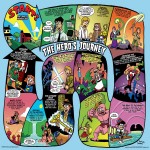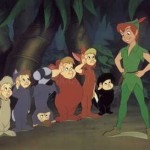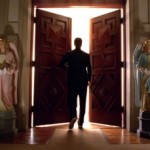 Enlightenment. The moment we consciously connect to eternal truth. It’s when we see through the veil of this illusionary world, rising above ego, time, materialism, and our own emotions to see the bigger picture—that we are all one. It’s what all gurus, spiritualists, yogis, Buddhists, monks, meditators, shamans, artists, writers, and religious leaders strive for. It’s the state Neo reached at the end of The Matrix, the level Dorothy attained so she could surpass time and space and return home, and the brief moment you get a taste of, usually in the shower, when your brain skips a beat on the record of reality, resulting in a little inspiration in line with your true self. But is there any way to speed up the process or at least know how close you are to the fully enlightened experience? I believe there is. And it’s something so unbelievably simple, you’ll be able to master it shortly after reading this blog posts.
Enlightenment. The moment we consciously connect to eternal truth. It’s when we see through the veil of this illusionary world, rising above ego, time, materialism, and our own emotions to see the bigger picture—that we are all one. It’s what all gurus, spiritualists, yogis, Buddhists, monks, meditators, shamans, artists, writers, and religious leaders strive for. It’s the state Neo reached at the end of The Matrix, the level Dorothy attained so she could surpass time and space and return home, and the brief moment you get a taste of, usually in the shower, when your brain skips a beat on the record of reality, resulting in a little inspiration in line with your true self. But is there any way to speed up the process or at least know how close you are to the fully enlightened experience? I believe there is. And it’s something so unbelievably simple, you’ll be able to master it shortly after reading this blog posts.
 When you’ve seen as many movies as I have, you begin to see that they all follow a certain pattern. This is true not just of movies, but of all great stories ranging from those found in classic mythology and literature to modern TV series and video games. Joseph Campbell called it the monomyth or hero’s journey. It’s basically a series of steps that the protagonist must go through during the course of his or her adventure. In addition to this, there are also a number of spiritual principles that often find their way into storytelling. By combining these principles with the monomyth, you can pretty much figure out where just about any story is headed. While this skill has proven to be incredibly annoying to my wife, it’s come in very handy for me. Not because I’ve continually annoyed her with my usually correct movie and TV show predictions, but because I’ve noticed that these storytelling rules apply to more than just fictitious stories. They also apply to real life.
When you’ve seen as many movies as I have, you begin to see that they all follow a certain pattern. This is true not just of movies, but of all great stories ranging from those found in classic mythology and literature to modern TV series and video games. Joseph Campbell called it the monomyth or hero’s journey. It’s basically a series of steps that the protagonist must go through during the course of his or her adventure. In addition to this, there are also a number of spiritual principles that often find their way into storytelling. By combining these principles with the monomyth, you can pretty much figure out where just about any story is headed. While this skill has proven to be incredibly annoying to my wife, it’s come in very handy for me. Not because I’ve continually annoyed her with my usually correct movie and TV show predictions, but because I’ve noticed that these storytelling rules apply to more than just fictitious stories. They also apply to real life.

I’m very excited about a new app coming out that is completely ahead of its time. It’s called GoogleFuture and it’s amazing. Applying the process of quantum computing, the app enables you to Google search anything, from any time period—including the future. And not just the future of your current timeline, but any possible future. Imagine being able to do a search on yourself to see what becomes of you based on certain choices and decisions—which job brought more success, which partner brought a more lasting relationship, which path brought the most fulfillment. With GoogleFuture there will be no more uncertainty, and really, no need for this article. Truth be told however, there actually are no plans for GoogleFuture, or anything similar, anytime soon as far as I know. But being able to figure out your destiny is really just as easy. Maybe, even easier.
 Those who move in spiritual circles often talk about how we are all connected, that our thoughts create our future reality, and that the universe provides us with clues about our direction in life. Personally, I look at spiritual principles as scientific rules that we just don’t understand yet. Not too long ago, the idea that people could get sick from tiny bugs they couldn’t see or that invisible waves could carry images or music was thought to be magical thinking, until science proved it to be true. So if these spiritual principles are indeed a rule of our universe, there should be a way to test and predict their occurrence. Doing this on an individual scale might prove challenging though, since one person’s thoughts may not have enough energy to make something manifest in a testable way. But what if there were an event that millions of people were focusing on, and this event inspired heated, emotionally charged thoughts that could result in only one of two possible outcomes? If only we had such an event, why, we just might be able to predict the future on a grand scale!
Those who move in spiritual circles often talk about how we are all connected, that our thoughts create our future reality, and that the universe provides us with clues about our direction in life. Personally, I look at spiritual principles as scientific rules that we just don’t understand yet. Not too long ago, the idea that people could get sick from tiny bugs they couldn’t see or that invisible waves could carry images or music was thought to be magical thinking, until science proved it to be true. So if these spiritual principles are indeed a rule of our universe, there should be a way to test and predict their occurrence. Doing this on an individual scale might prove challenging though, since one person’s thoughts may not have enough energy to make something manifest in a testable way. But what if there were an event that millions of people were focusing on, and this event inspired heated, emotionally charged thoughts that could result in only one of two possible outcomes? If only we had such an event, why, we just might be able to predict the future on a grand scale!
 Back in June 2009, I wrote an article titled “Proof That We’re Living a Life of Illusion.” In it, I provided what I felt was overwhelming evidence that we all live in some kind of computer simulation. I also offered some simple explanations as to why I thought we did. At the time, the people who are open to believing in such fantastical theories excitedly agreed with the premise, while those who rely on hard-core scientific proof, did not. Well, a funny thing’s happened in the years since I wrote that article. Scientists are beginning to see the evidence that the non-believers require. The question now is, whether those skeptics will decide to take the blue pill or the red pill?
Back in June 2009, I wrote an article titled “Proof That We’re Living a Life of Illusion.” In it, I provided what I felt was overwhelming evidence that we all live in some kind of computer simulation. I also offered some simple explanations as to why I thought we did. At the time, the people who are open to believing in such fantastical theories excitedly agreed with the premise, while those who rely on hard-core scientific proof, did not. Well, a funny thing’s happened in the years since I wrote that article. Scientists are beginning to see the evidence that the non-believers require. The question now is, whether those skeptics will decide to take the blue pill or the red pill?
 Disney taught us that, “when you wish upon a star, your dreams come true.” Unfortunately, if your dream is to have both of your parents live to see you succeed, you’re sheer out of luck. In fact, of Disney’s forty full-length animated features from 1937 until 2000, I know of only one where the protagonist’s parents remain alive for the entire film.* Then there’s the fact that just about every super-powered hero is an orphan. If this isn’t bad enough, one or both of the hero’s adoptive parents often dies too! Superman lost his adoptive dad, Spider-Man lost his uncle, and Luke Skywalker lost both his aunt and uncle. With the Amazing Spider-Man movie set for release this summer, and that movie actually exploring the mysterious back-story about Peter Parker’s real parents, I thought it would be a good time to delve into the topic of why so many of our heroes—both super and animated—are orphans, and what the message means for all of us.
Disney taught us that, “when you wish upon a star, your dreams come true.” Unfortunately, if your dream is to have both of your parents live to see you succeed, you’re sheer out of luck. In fact, of Disney’s forty full-length animated features from 1937 until 2000, I know of only one where the protagonist’s parents remain alive for the entire film.* Then there’s the fact that just about every super-powered hero is an orphan. If this isn’t bad enough, one or both of the hero’s adoptive parents often dies too! Superman lost his adoptive dad, Spider-Man lost his uncle, and Luke Skywalker lost both his aunt and uncle. With the Amazing Spider-Man movie set for release this summer, and that movie actually exploring the mysterious back-story about Peter Parker’s real parents, I thought it would be a good time to delve into the topic of why so many of our heroes—both super and animated—are orphans, and what the message means for all of us.
 In a New York Press article from August, 2011, film producer and director Tommy Pallotta, said, “I am a fan of audience participation, but I also think audiences like to be told a story. There’s this thing video game designers call a ‘golden path’—there’s a definite way that the majority of people are going to experience the game, and the designers plot that. A lot of the interactivity in a video game is really just the illusion of interactivity. It’s about engaging the audience and giving at least the feeling of volition. But as the artist you have the sense that you are, in some way, controlling it, blending the craft of storytelling with the illusion of agency.” In other words, in a game you think you are controlling the action, but really it’s already been pre-programmed. Kind of like what we think of as destiny. In fact, maybe that’s exactly what destiny is: the path we are meant to take in order to have the most fulfilling experience.
In a New York Press article from August, 2011, film producer and director Tommy Pallotta, said, “I am a fan of audience participation, but I also think audiences like to be told a story. There’s this thing video game designers call a ‘golden path’—there’s a definite way that the majority of people are going to experience the game, and the designers plot that. A lot of the interactivity in a video game is really just the illusion of interactivity. It’s about engaging the audience and giving at least the feeling of volition. But as the artist you have the sense that you are, in some way, controlling it, blending the craft of storytelling with the illusion of agency.” In other words, in a game you think you are controlling the action, but really it’s already been pre-programmed. Kind of like what we think of as destiny. In fact, maybe that’s exactly what destiny is: the path we are meant to take in order to have the most fulfilling experience.
 Lost is dead. Long live Lost. And so it ends, in much the same way it began—with a close-up of Jack’s eye, staring straight up past the tall stalks of bamboo that circled the sky above. This time however, that eye would close, and with it, our six-season journey that took us right back to where we started—with questions about a mysterious show that seemed to parallel the mysteries of life. For some, the journey was far more compelling than the destination. For others, it was the perfect resolution and they can walk away feeling fulfilled. Whatever you thought about the conclusion, the one thing most viewers can agree on is that the show challenged us to think in ways we might not have otherwise. In short, Lost was a real trip. And what a long, strange trip it’s been.
Lost is dead. Long live Lost. And so it ends, in much the same way it began—with a close-up of Jack’s eye, staring straight up past the tall stalks of bamboo that circled the sky above. This time however, that eye would close, and with it, our six-season journey that took us right back to where we started—with questions about a mysterious show that seemed to parallel the mysteries of life. For some, the journey was far more compelling than the destination. For others, it was the perfect resolution and they can walk away feeling fulfilled. Whatever you thought about the conclusion, the one thing most viewers can agree on is that the show challenged us to think in ways we might not have otherwise. In short, Lost was a real trip. And what a long, strange trip it’s been.
 In the penultimate episode of Lost, “What They Died For,” Jacob tells the surviving Losties why he chose them as candidates: “I chose you because you were all alone. You were all looking for something that you couldn’t find out there. I chose you because you needed this place as much as it needed you.” This explanation really resonated with me, on one hand because it provided a mythologically sound answer to the main question I’ve always had about Lost: why do all these characters have major issues? And having that answer provided the other reason I really liked the explanation: I immediately understood that while Jacob was addressing the remaining candidates, he was really speaking to us.
In the penultimate episode of Lost, “What They Died For,” Jacob tells the surviving Losties why he chose them as candidates: “I chose you because you were all alone. You were all looking for something that you couldn’t find out there. I chose you because you needed this place as much as it needed you.” This explanation really resonated with me, on one hand because it provided a mythologically sound answer to the main question I’ve always had about Lost: why do all these characters have major issues? And having that answer provided the other reason I really liked the explanation: I immediately understood that while Jacob was addressing the remaining candidates, he was really speaking to us.
 In “Across the Sea,” Lost finally gives us the origins story for Jacob and the Man In Black. The episode was pure, 100% mythology. Those who watched the episode based on the surface story alone were probably disappointed. Let’s face it, taken literally, myths are silly: talking snakes, little boys defeating giants, jealous gods, immaculate conceptions, mortals with superpowers, a sword stuck in a stone, the Force, Never Never Land, Wonderland, Oz, the Matrix, the Island. On the surface, all myths seem like children’s stories. It’s only when we dig deeper that we find the truth worthy of a wise old soul—a soul that knows where it really came from.
In “Across the Sea,” Lost finally gives us the origins story for Jacob and the Man In Black. The episode was pure, 100% mythology. Those who watched the episode based on the surface story alone were probably disappointed. Let’s face it, taken literally, myths are silly: talking snakes, little boys defeating giants, jealous gods, immaculate conceptions, mortals with superpowers, a sword stuck in a stone, the Force, Never Never Land, Wonderland, Oz, the Matrix, the Island. On the surface, all myths seem like children’s stories. It’s only when we dig deeper that we find the truth worthy of a wise old soul—a soul that knows where it really came from.
 Enlightenment. The moment we consciously connect to eternal truth. It’s when we see through the veil of this illusionary world, rising above ego, time, materialism, and our own emotions to see the bigger picture—that we are all one. It’s what all gurus, spiritualists, yogis, Buddhists, monks, meditators, shamans, artists, writers, and religious leaders strive for. It’s the state Neo reached at the end of The Matrix, the level Dorothy attained so she could surpass time and space and return home, and the brief moment you get a taste of, usually in the shower, when your brain skips a beat on the record of reality, resulting in a little inspiration in line with your true self. But is there any way to speed up the process or at least know how close you are to the fully enlightened experience? I believe there is. And it’s something so unbelievably simple, you’ll be able to master it shortly after reading this blog posts.
Enlightenment. The moment we consciously connect to eternal truth. It’s when we see through the veil of this illusionary world, rising above ego, time, materialism, and our own emotions to see the bigger picture—that we are all one. It’s what all gurus, spiritualists, yogis, Buddhists, monks, meditators, shamans, artists, writers, and religious leaders strive for. It’s the state Neo reached at the end of The Matrix, the level Dorothy attained so she could surpass time and space and return home, and the brief moment you get a taste of, usually in the shower, when your brain skips a beat on the record of reality, resulting in a little inspiration in line with your true self. But is there any way to speed up the process or at least know how close you are to the fully enlightened experience? I believe there is. And it’s something so unbelievably simple, you’ll be able to master it shortly after reading this blog posts.









